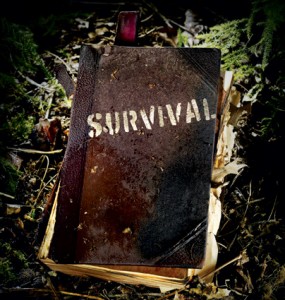Information Survival: Your Life Depends on It
 I became a professional identity theft speaker because my business partner used my identity (and my business’s impeccable 40-year reputation) to embezzle more than a quarter million dollars from our best, most trusting customers. Thanks to drawn-out criminal trials and a seriously impaired lack of attention to my business, I suddenly found myself without a profession.
I became a professional identity theft speaker because my business partner used my identity (and my business’s impeccable 40-year reputation) to embezzle more than a quarter million dollars from our best, most trusting customers. Thanks to drawn-out criminal trials and a seriously impaired lack of attention to my business, I suddenly found myself without a profession.
So I wrote a book about my mistakes, and with a little luck, it led to a speaking career based in first-hand experiences with data theft. The formula works – sharing my failure to protect sensitive information and losing just about everything as a result – my wealth, my business, my job and nearly my family – is a powerful motivator for audiences, both as individuals and professionals. People only understand and act upon the corrosive nature of this crime when they can taste it’s bitterness for themselves. My goal has always been to provide a safe and effective appetizer of data theft that convinces audiences to feed on prevention rather than recovery.
But I’ve realized through my contact with exceptionally smart people, from the Pentagon and Department of Homeland Security to Fortune 500 executives and privacy experts, that identity theft (and it’s close business relative, data breach), are just symptoms of a larger movement undermining personal lives and profit margins on a daily basis — a movement that demands we be trained in the art of information survival.
What is Information Survival?
We are bombarded by information, 24 hours a day – 24/7 news, email, Facebook, Twitter, LinkedIn, YouTube, texting, instant messaging, voice mail, cell phones – and the mobile revolution means that we have access at all times of the day, every where we go. Confronted by so much data, we are often forced to process it instantly, relying on shortcuts and bad data along the way to make rapid decisions at digital speeds. And when we make rapid decisions, we often make mistakes.
Recently, Tyler Clementi, a student at Rutgers University, witnessed the cruel speed and ubiquity of information when his room mates posted a YouTube video of him having what he believed was a private sexual encounter in his dorm room. Humiliated, Tyler made a rushed decision to throw his young life over the George Washington bridge. His is the cruelest failure of information survival because Tyler never had a chance to control the information, the video, that would destroy him. Thankfully, we can teach other youngsters how to control what information they can control, and how to survive the rest.
Best selling author, Larry Winget, put it well in a post on my Facebook wall last week:
I agree that teaching our children not to bully others is an issue that must be addressed – but teaching our children not to be victims of bullies is more important. — Larry Winget (emphasis mine)
Information survival is the skill set that allows each of us to weather the downsides of a data-driven economy, to thrive in a knowledge-is-power world without stooping to use information as a weapon, like Tyler’s roommates did. Information survival is part data control, part self-esteem.
When we consciously withhold certain information from our Facebook profile (date of birth, hometown, current location), we are engaging in information survival. When the United States forms a task force to defend our power plants, stock markets, banks, air traffic control, water supply and phone connections against cyber attack, we are acknowledging the power of information, and the imperative of survival training. The company employee who refuses to transmit sensitive data on an unprotected wireless connection in a cafe, the executive who leads by example while instilling a culture of privacy in his corporation, the college student who understands the destructive power of their next post — these are all examples of information survival in action.
Don’t wait to train your people on information survival – whether they are your kids, your employees, or yourself.
John Sileo is a professional speaker on information survival, social media exposure, identity theft and cyber crime for the Department of Defense, Fortune 1000 companies and any organization that wants to protect the profitability of their private information. Contact him directly on 800.258.8076 or visit his speaker’s website at www.ThinkLikeASpy.com.
Sorry, comments for this entry are closed at this time.









1 Responses to Information Survival: Your Life Depends on It
WoW!!!!!! It’s a great offer to protect your spouse or significant other…… for FREE!!!!!!!!!!!! Just click and see.